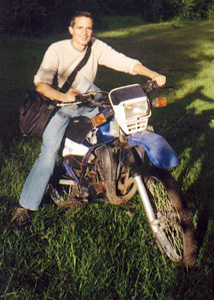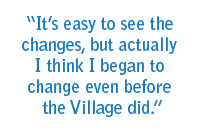 Bill Repicci, born in Batavia, NY, has taught school in northern Kenya, run programs for the developmentally disabled in Alaska, produced over 25 plays in New York (“Swingtime Canteen,” “Jodie’s Body,” “Squonk”), been CEO of a dramatic publishing company, and recently returned to Africa and then Southeast Asia on a two-year humanitarian project. He was just hired as President and CEO of the Lymphatic Education & Research Network (LE&RN).
Bill Repicci, born in Batavia, NY, has taught school in northern Kenya, run programs for the developmentally disabled in Alaska, produced over 25 plays in New York (“Swingtime Canteen,” “Jodie’s Body,” “Squonk”), been CEO of a dramatic publishing company, and recently returned to Africa and then Southeast Asia on a two-year humanitarian project. He was just hired as President and CEO of the Lymphatic Education & Research Network (LE&RN).
Growing up in a small town in western New York, Bill Repicci not only had dreams of seeing the world, but the kind of support from his parents that empowered him to make his own way and follow those dreams. “My mother would say, ‘Never be afraid to do the things you need to do to be happy’,” he recalls. “And my father, no matter what I told him I was going to do, would always give me his blessing.”
This blessing was just what he needed when—as he was graduating with a degree in philosophy from LeMoyne College in the 70s—a unique opportunity arose. “I ended up teaching English and history at a secondary school in Mandera, Kenya,” he says. “It was on the Somali-Ethiopian border and the Kenyans had found it impossible to engage locals to teach there due to the constant tribal warfare. It was a wonderful and challenging adventure for me, though. After two years, I returned to the States and was introduced to an organization that was working with people who were developmentally disabled. This was an exciting era of change in that field and it led me to pursue graduate work in Scandinavia and to become a psychologist. For the next fifteen years this would be the focus of my life, including nine years as executive director of the Fairbanks Resource Agency in Alaska.”
So how did Repicci segue from running an organization for the developmentally disabled in Alaska to producing theatre in New York? “While I was living in Alaska,” he recalls, “I also had a sublet in New York. One year I saw a riveting play here called Creeps, written by a man with cerebral palsy. It was about the frustration of individuals with that disorder trying to live on equal terms in society. I brought the cast up to Alaska and produced the play throughout the state to inspire a change in attitudes and program models.” The success of that turned into a U.S. tour, after which Repicci made a decision. In 1987 he came back to New York for good, bought an apartment on Horatio Street, and immersed himself in theatre. “As it happens, one night I was introduced to John Glines who had produced Torch Song Trilogy,” he says. “We became great friends and began producing together.”
At that time, Sheridan Square was the epicenter of his world. “Here I found a sense of freedom I had never experienced before,” he says. Much of his personal and professional exploits over the next several years would occur right around that area. He would go on to produce numerous plays at the Grove Street Theatre and Actors Playhouse. He would record an album with Marie Blake, who played piano for many years at The 5 Oaks on Grove Street. And he would produce a documentary called The Ladies of Grove Street, which featured Marie, as well as Gladys Easter and Arthur’s Tavern pianist, Mabel Godwin. “For me, the day started at Pennyfeathers for breakfast and it meant a BLT at the Riviera for lunch,” he says. “It meant being at one of my shows at night and then going to The 5 Oaks, or the Monster, or the Duplex with friends afterwards, capped off by a 4 a.m. snack at Tiffany’s. It was a wonderful, contained world that I rarely had to leave.”
 When asked how the West Village has changed over the years, Repicci offers a unique insight. “What makes that an elusive question to answer is that one has to factor in how they have changed as well,” he says. “It’s easy to see the changes, but actually I think I began to change even before the Village did. So many of the places I used to frequent are gone now. The theatres I used to produce in have disappeared. But in reality I had stopped going to those places, and I had stopped producing in the Village in favor of Broadway or Off-Broadway theaters uptown. So as I got older I left a lot of that romantic past behind even before it disappeared on its own. The bittersweet melancholy that I might feel comes not only from looking back fondly on a era that has passed, but one that I’ve moved on from as well.”
When asked how the West Village has changed over the years, Repicci offers a unique insight. “What makes that an elusive question to answer is that one has to factor in how they have changed as well,” he says. “It’s easy to see the changes, but actually I think I began to change even before the Village did. So many of the places I used to frequent are gone now. The theatres I used to produce in have disappeared. But in reality I had stopped going to those places, and I had stopped producing in the Village in favor of Broadway or Off-Broadway theaters uptown. So as I got older I left a lot of that romantic past behind even before it disappeared on its own. The bittersweet melancholy that I might feel comes not only from looking back fondly on a era that has passed, but one that I’ve moved on from as well.”
Bill Repicci in Kenya, 2006. Photo: Virgilio Pante
